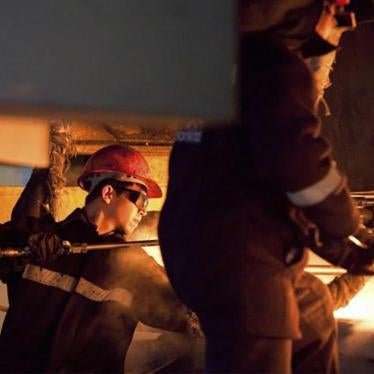Mr. Dragan Djilas
Mayor of the City of Belgrade
Office of the City of Belgrade
Trg Nikole Pasica 6
11 000 Belgrade, Republic of Serbia
Re: Forced Closure of Roma Settlements in Belgrade
Dear Mr. Djilas,
Human Rights Watch is writing to express our deep concern about the forced closure of Roma settlements and eviction of their inhabitants by the City of Belgrade authorities.
We understand that the closures are taking place under the Action Plan for Dismantling of Unhygienic Settlements in Belgrade, adopted on May 28, 2009. According to our information, the Roma communities affected by the plan have not been made aware of its existence, or consulted about its content. Almost a year after its adoption, the plan has yet to be made public, despite requests from Serbian non-governmental organizations, most recently by Praxis on April 23, 2010.
In April 2009, we wrote jointly with the European Roma Rights Centre to you and the government of Serbia to express our concern about evictions about Roma families in an informal settlement in Novi Beograd. In that letter, we urged you "to ensure that in the future similar actions are undertaken in a manner which protects the rights of occupants laid out in international law."
Yet, according to information received by Human Rights Watch, the subsequent evictions from the Roma settlements in Belgrade (including the eviction from the so-called ‘Gazela settlement' in August 2009 and in April 2010 in the so-called ‘Lazara Kujundzica settlement' in the Cukarica area in Belgrade) have been carried out in a way that did not protect these rights, with residents being subject to misinformation and instances of intimidation of the settlements' residents by contractors and in some cases even municipal officials. These troubling facts were reported, inter alia, by various NGOs and organizations, including Praxis, the Roma rights organization Chachipe, and Amnesty International.
In both cases, the residents were reportedly moved either to inadequate metal containers in the outskirts of Belgrade or simply sent back on a bus to their municipalities of origin, mainly in southern Serbia, an area particularly affected by the economic crisis, with few opportunities for Roma. Roma returned to regions of origin are offered a small one-off payment of around EUR 100-200 (with no form of further assistance offered otherwise). During the weeks that followed the evictions, some of the Roma apparently returned to Belgrade, mainly squatting in some other informal settlements there.
We are aware that, following the intervention of local and international human rights NGOs, living conditions in the containers have improved in the past couple of months, with more shower cabins provided for, that some families have been offered jobs by the city of Belgrade, and that others found a place on the waiting lists for social housings. Nevertheless, the way the city of Belgrade has handled the resettlements thus far has resulted in various violations of human rights of the residents of the affected settlements, including the right to information, proper housing and compensation.
Human Rights Watch is particularly concerned that the Roma communities living in the settlements to be affected by this plan have not been informed of their situation or the plan to relocate them, or consulted on what options might be available to them. Given the experience of prior closures of the Roma settlements under this plan, there is a real risk that evictions will serve to worsen the situation of the Roma currently living there.
As a party to the International Covenant on Civil and Political Rights (ICCPR) and the European Convention on Human Rights, Serbia is obliged to protect its residents against forced evictions, as well as to enforce its residents' rights to housing, private and family life.
We therefore urge you to ensure that you resettlement plans meet the following conditions:
- The Action Plan should be published without delay; Roma and other affected communities and non-governmental organizations should be invited to comment on it, and the plan should be amended to reflect that input;
- Any specific operations to evict Roma families should be taken following prior consultation with the families affected on the available options, and the opportunity to seek legal redress;
- Alternative housing arrangements should be adequate and sustainable. In this context, moving people to metal containers must not be treated as a permanent solution. To this effect, there needs to be a clear timeline for the period of transition during which the affected families are to be housed in temporary housing and arrangements for sustainable alternatives must be arranged prior to the eviction;
- Any temporary solution must provide the affected families with adequate access to hygiene (adequate number of showers and bathrooms need to be made available), schooling, health care and social assistance;
- Income-generation opportunities for the Roma should form an integral part of the planned resettlement processes;
- Families originally from southern Serbia and other locations outside Belgrade should be offered resettlement in Belgrade as an alternative to return to their region of origin; and
- Financial compensation should be provided for any belongings destroyed in the course of evictions.
We are aware that the city of Belgrade is currently collaborating with the European Bank for Reconstruction and Development (EBRD) and the European Investment Bank (EIB) on three infrastructure development projects, which may result in the closure of the Roma informal settlements located in the areas encompassed by or the vicinity of these projects: the Belgrade Bypass and Highway Project (known as the ‘Gazela Bridge' project) - already carried through as described on earlier in this letter, as well the construction of the new bridge over the Sava river (known as the ‘Sava Bridge' project) and the construction of a large capacity feeder roads leading to the Sava Bridge (known as the ‘Sava Feeder Roads'). We would like to urge you to closely collaborate with the EBRD and EIB to jointly agree on a sustainable solution for the affected communities, both already evicted and those that still may need to be relocated. We would also like to urge both lending organizations involved to ensure that their loans do not result in human rights abuses.
We thank you in advance for your urgent attention to these concerns and your anticipated action to address them.
Sincerely,
Benjamin Ward
Deputy Director
Europe and Central Asia division
Cc:
Mirko Cvetkovic, Prime Minister of the Republic of Serbia
Bozidar Djelic, Deputy Prime Minister for EU Integration of the Republic of Serbia
Svetozar Ciplic, Minister of Human and Minority Rights, Republic of Serbia
Stefan Fule, EU Commissioner for Enlargement, European Commission
Vincent Degert, Head of the EU Delegation to the Republic of Serbia
Thomas Hackett, Director General, European Investment Bank
Thomas Mirow, President of the European Bank for Reconstruction and Development






